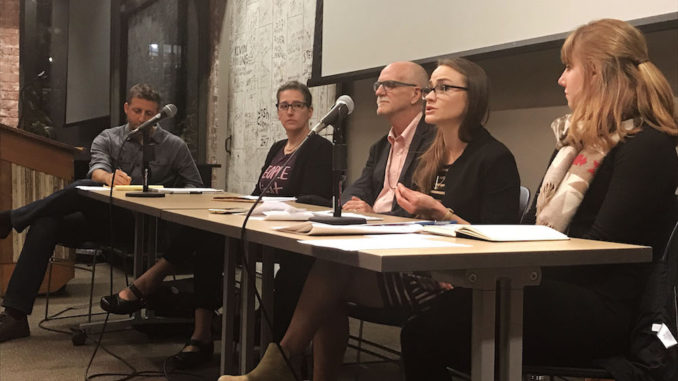
By Alix Soliman
The Lewis & Clark Environmental Studies Program kicked off their 20th annual Environmental Affairs Symposium from Oct. 24 to 26 with a keynote panel, followed by a student engagement training and project proposal session. Due to the divisive political climate engendered by rollbacks in environmental legislation, the theme this year is “Environmental Engagement in Tough Times.”
“These are indeed tough times, and environments, once a rallying cry for unity given our common stewardship of earth, are now just as divisive a terrain as others,” Director of Environmental Studies Jim Proctor said. “We have the opportunity, at each moment when we encounter others in the context of the environmental issues we care deeply about, to practice environmental engagement.”
The keynote panel was held in the Ecotrust building in downtown Portland on Oct. 24, titled “Growing in Portland: Whose Livability?” The panel consisted of various executives of both municipal bureaus and community organizations, and was moderated by Executive Director of Oregon Humanities Adam Davis.
The panelists debated Portland’s 2035 Comprehensive Plan, which proposes using five guiding principles to determine how growth in the city will be balanced and implemented. These principles are economic prosperity, human health, environmental health, equity and resilience.
“We knew we wanted to model the kind of civil disagreement that really happens in Portland around growth,” Proctor said. “It’s a vexing issue and it’s an issue for which we all have concern.”
The keynote event was held downtown to get students off campus and into the world instead of inviting the world onto campus.
“I just love seeing the students interact with Portlanders,” Proctor said. “We’re on the hill, we’re not the urban (Portland State University) campus. It’s more difficult to really interact.”
Following the panel debate, LC students, faculty, staff and members of the Portland community discussed the growth they had observed in their hometowns and its consequences.
“Clearly (the conversations) were lively, and I just think it set a tone for honesty, and to me, that’s a good way to move forward with engagement,” Proctor said.
Alex Groher-Jick ’18 was struck by how different from him other people thought on this topic.
“I’m surprised that more people are upset about growth,” Groher-Jick said. “To hear the ‘I was here first’ argument was shocking, and that there are a lot of wealthy people that are upset about growth.”
Marlene Guzman ’19 was introduced to the multidimensional aspects of growth that she had not been aware of previously.
“It complicated the issue of urban planning for me, and it was easier to see why that was the case, why growth is such a contested issue,” Guzman said.
The planners were pleased with their decision to have a spirited panel debate and group discussion for the keynote event rather than a lecture followed by a question and answer period, as was done in previous environmental symposia.
“What I loved about this was that (the panelists), with their life’s work, had skin in the game,” Davis said. “It’s more than a topic they’re studying, it’s their blood, sweat, and tears, and not in identical ways.”
Symposium Student Organizer Georgia Reid ’19 talked about her preference for a more collaborative approach.
“Choosing to make it participation based was a really important decision we made, and I loved how it turned out,” Reid said.
This year’s symposium reflected the goals and organization of the new required course for the environmental studies program, ENVS 295: Environmental Engagement. The symposium leaders came directly from this class.
“It provides more continuity and more broad-based student support than we’ve had in the past with our maybe one or two chairs who get saddled with too much work, so it seems to be a better model so far,” Proctor said.
“Rather than spending our budget on various speakers and banquets throughout a jam-packed week, we’re giving that money directly back to students through student initiated engagement projects,” Student Organizer Nicole Godbout said.
The organizers expect approximately 10 events and 10 projects to be carried out in 2017-18.
Subscribe to the Mossy Log Newsletter
Stay up to date with the goings-on at Lewis & Clark! Get the top stories or your favorite section delivered to your inbox whenever we release a new issue.

Leave a Reply